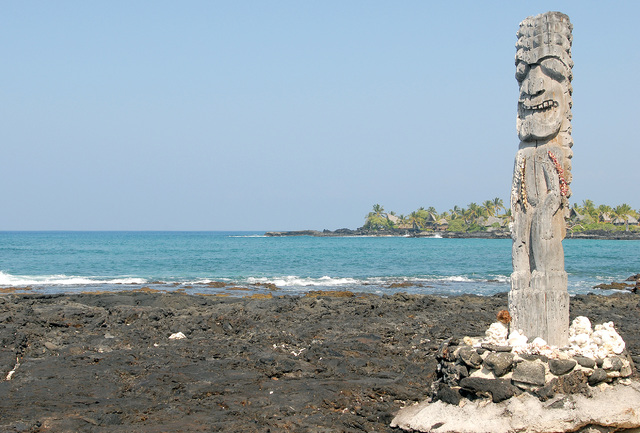KAILUA-KONA — “Try Wait.”
KAILUA-KONA — “Try Wait.”
It’s now a reality for the next decade on one West Hawaii reef.
The Board of Land and Natural Resources gave final approval Friday for a marine reserve at Kaupulehu, where a 10-year moratorium will be placed on the harvest of fish along a 3.6-mile stretch of coastline.
The kapu will be in effect until June 30, 2026, and is designed to give the depleted fish stocks a chance to recover while a subsistence fishery management plan for the area is crafted with local input. It’s the first such no-take area on the island, although a third of the West Hawaii shoreline is already off limits to aquarium fishing.
The removal of fish, reef structure, coral or algae is prohibited out to 120 feet of depth under the reserve designation, protecting fish targeted for food, which biologists say have declined significantly in studies from 1992 to 2012. Fish such as ehu, onaga and opakapaka could still be harvest from 120 feet of water out to the reserve’s boundary at 600 feet of depth.
The rule now goes to the attorney general for approval of its form, then to the governor for his signature. It takes effect 10 days after it is filed with the Office of the Lt. Governor.
Some fishermen have chafed at the lack of access and the precedent the closure could set. Some opposing the plan said fish stocks are healthy and the closure is unnecessary, or the declines are due to factors other than fishing. But many lineal descendants and members of the Kaupulehu Marine Life Advisory Committee have worked for years to get the reserve established, saying the reef near the Four Seasons Resort Hualalai has suffered decades of over-exploitation due to the increased access that came with the establishment of the resort and the building of Queen Kaahumanu Highway.
“This is a triumph for those who want to restore our environment, restore the richness of our marine blessings and see that there are more of everything into the future,” said Tina Owens, who co-chaired the West Hawaii Fishery Council while it helped draft the language of the rule creating the reserve.
“Allowing unlimited, unmanaged take of fish is a worldwide problem,” Owens said. “Not addressing this problem will result in a breakdown of all the world’s fisheries. Everyone who wants to see fishing continue through the next century should applaud these kinds of proposals.”
The state Division of Aquatic Resources received two petitions, one with 680 signatures supporting the plan and one with 489 signatures against it, and DAR officials sat through hours of testimony on “Try Wait” in February, with 63 people speaking in support, and five against.
In all, the agency received oral testimony, letters and form letters from 471 people and 13 organizations. More than 62 percent favored the plan, while 37.4 percent were opposed.
Count Honokaa fisherman Wes Murakane among those who felt their voices went unheard. He predicted the closure will drag on as a new land board fails to lift the ban 10 years from now.
“I think there should have been more back and forth with people and working together, get in the water and do the counts together — not a paid biologist. Then I think it would be easier for everyone to accept closures,” he said.
The real trouble on the reef is lack of enforcement of existing rules due to understaffing of enforcement officers, said Murakane.
“DLNR doesn’t have the manpower to enforce and we keep adding to their plate,” he said.




